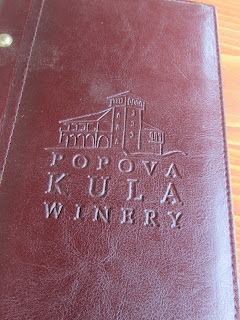I was searching for where one could purchase North Maceodnian wines here in the US (for a Fulbright Association reception/wine tasting event), when I happened upon my blog featured on the Popova Kula Winery website!
During my search I learned that there ARE some places in the US where one could purchase Popova Kula wines -- but -- not here.
On our way back from the archeological site Stobi, we stopped at the Popova Kula winery (the self-proclaimed "Temple of Wine").
It was an overcast (and drizzly) day, but still the views of the
vineyards in the mountains were spectacular. We enjoyed a tasting on
the (covered) patio, overlooking the grounds (and the events that were
taking place that day). We sampled the Altan, Stanushina Rose,
Prokupec, Vranec, and Muscat Ottonel.
Our server told us that there is a Museum of Wine in Demir Kapja. I found the website, here --
http://www.museumdk.mk/index.php/en/about-us/about-museum
We were not able to add that museum to our itinerary on this excursion, but, would be fun to do on a return trip.
About the location, from the Popova Kula website:
"The Popova Kula Winery and vineyards are located on the south slopes of
the Grand Hill (Veliko Brdo) west of the lovely town of Demir Kapija and
close to the highway E-75.
Demir Kapija valley lays on the southeast part of the
Tikveshiya grape growing sub-region that is a part of the Povardarie
region.
The oldest archeological findings proving that people in
this area have grown vineyards and have made wine date 13 century b.c.
It is a location with excellent climate and perfect soil for grape growing.
King Aleksander Karadjordjevic had a kingdom that stretched
across present day Macedonia, Serbia, Croatia,Bosnia and Slovenia,
including the Adriatic coast and Panonian Valley. He had vast
possibilities to choose from for the location of his vineyard. However,
following the advice of trusted consultants King Aleksander chose
wisely and planted his first vines in the micro region of Demir Kapija
on exactly the same location where we have our vineyards today."
The website also explains the origin of their name:
"To remain faithful to the people and historical fabric of the region,
our winery was named after an important tower, the Popova Kula (Priest’s
Tower) which once served as an important checkpoint on the old Roman
road that passes next to our location.
The Popova Kula served as important markers of the region
but has since been destroyed. In tribute we have erected a new 17m high
tower and named the winery Popova Kula."
Here is the Popova Kula website:
http://popovakula.com.mk/
and the Popoval Kula facebook page:
https://www.facebook.com/Popova-Kula-Winery-301452074622/
I note on their website a link to how to buy the Popova Kula wines in
the US -- and it looks like they can be shipped to Florida. So we will
be able to enjoy a Macedonian Vranec after we return home.


 |
| my daughter enjoyed playing soccer with other kids while we enjoyed the wine and cheese |




































